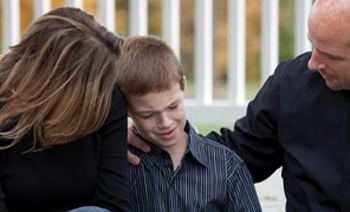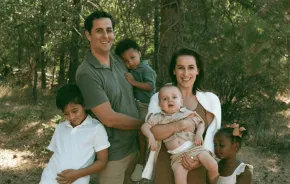 Read part 1 and part 2 of our series.
Read part 1 and part 2 of our series.
The divorce — intense, demanding and emotionally draining — is finally over. Now you’re picking up the pieces, determined to keep your children on track and in line.
Everyone is advising you to “move on.”
The truth is, you’re ready to look ahead and face life without your ex. You’re venturing out with friends, even sneaking peeks at online dating sites.
But the relationship thing, you realize, is different this time around. You worry about the way your kids will react if you bring someone new into their lives; about whether your ex will be cooperative, jealous, intrusive or a combination of all three; about your next love interest — what if he comes with his own kids and a jealous, intrusive ex?
Maybe by now you’ve learned a few things about relationships, families and yourself. Even so, fusing the family with dating and — who knows? — remarrying, is challenging no matter how well versed you are (or think you are) about the rules, management and etiquette of divorce. After all, the same studies (see divorce.com) that suggest 50 percent of all marriages end in divorce also claim second marriages fail a whopping 65 percent of the time.
Should he meet the kids?
Jenny, married for 15 years before her divorce six years ago, keeps her kids and her dates apart until things get serious. “I don’t think it’s healthy for my children to connect with someone I’m seeing, then have that person go away.”
Jenny says she very focused on the well-being of her kids, now ages 19, 16 and 14. That’s why she’s careful about who they meet — and when. Still, her children have felt the fallout of broken relationships. Since Jenny’s divorce, she’s been engaged — twice — to the same person. “The kids’ hearts were in that relationship. When we broke it off, it was another big loss for them.”
Dr. Cora Breuner, associate professor of adolescent medicine at Seattle Children’s, advises divorced parents to proceed with caution when it comes to injecting a new partner into their kids’ world. “We’re so careful with other things — making sure our kids are in car seats, the right cribs, the right schools — but we often don’t give this issue much thought,” she says.
Breuner says parents should do some serious introspection before exposing their children to a significant someone. “Is this the person you’re willing to integrate into your family? Are your kids really ready to meet someone new?” Waiting mere weeks before introducing that someone isn’t enough, she says. She’d like three or four months to pass — and she’d like the couple to survive an argument or two.
“Check in with yourself first,” says Breuner. “Be careful that you’re not getting right back into the same mess you were in before. Don’t pull someone back into your kids’ lives and watch your kids have to mop you up again.”
Yet kids seem to want — and often encourage — their divorced folks to date, parents report. That’s because they think a romantic relationship is what will make mom or dad happy, says Stephen P. Chick, a Snoqualmie mental health therapist. “That’s what’s promoted everywhere — on Disney shows, in school, when kids see other moms and dads together.”
And kids typically feel relieved when a new adult appears on the scene. “Often, a divorced parent starts to depend on the kids as their support person,” says Breuner. “When another adult comes into the picture, some of that burden is taken off the child.”
There’s a “honeymoon phase” that happens in the early stages of a new relationship when everyone is on their best behavior, says Chick. Then the honeymoon ends and the tension begins. “The kids soon realize it’s not all fun and games. They’re not seeing their mom or dad as much. Maybe they don’t like the new boyfriend or girlfriend.”
This generates stress, says Chick. “The divorce is a bomb that goes off in a kid’s life. Then the parent starts dating, and it creates another mini-bomb.”
Managing the stress
Things can heat up for the children when one parent has strong views about the other parent’s new boyfriend or girlfriend — and voices those views to the kids. These are the kids who end up with eating disorders, headaches or stomach pain, says Breuner. “They are so anxious and stressed, they can’t get into a relaxed place.”
If the new “friend” caused the divorce, the heat cranks up. “If your relationship started with an affair, you cannot expect your children to welcome your new friend with open arms,” says Robert E. Emery, Ph.D., in his book The Truth About Children and Divorce.
What else makes kids anxious? Parents who let a new boyfriend, girlfriend or spouse act like a parent. “Parents tend to give their partners power,” says Breuner. “That’s not fair to the child’s other parent and not cool for the child. The new person is not the child’s parent and never will be.”
That means it’s not the partner’ job to criticize or reprimand the child. “That kind of overstepping the bounds can cause horrible damage and can take months to fix,” says Breuner. What, then, is the new partner’s role? Think “friend.” He (or she) should work on bonding with the kids and building their trust, says Chick, especially if he intends to be in there for the long haul. “He needs to throw the ball with them, go to the ballet classes, drive the carpools, play the video games. That’s the trust building.”
Moving in
After three years of dating, Ken and Sherry moved into their Seattle home two years ago with their daughters — they each have two —– ages 13 through 18. “My girls really wanted this to work for me, but it was difficult for them,” says Ken. “They didn’t choose to be put together with these other kids.”
Ken and Sherry share custody of the girls with their former spouses, which means they must schedule a convoluted calendar of sleepovers, doctor appointments, school events and social activities, while toggling houses, backpacks and parents.
It also means they must navigate their dramatically different parenting styles. “When I’m with my kids, I always block out that time and don’t make other plans,” says Ken. Sherry finds that kind of attention excessive and feels it makes having a social life next to impossible. A doting dad, Ken is always on call. “I’ll pick the kids up anywhere, anytime. I’ll run and get the bagels and pop when they’re doing a school project,” says Ken. Sherry, hoping to instill independence, is more likely to let the girls fend for themselves.
How do they make it work? They’ve learned to bend — just a little — in their partner’s direction. Ken has scaled back his hovering-helicopter style, and Sherry has become more involved and hands on. “We’ve both been influenced by each other,” says Ken.
Ken and Sherry seem to be doing well. And the kids? They’re doing well, too. “It’s a work in progress,” says Ken. In June, his oldest daughter graduated from high school. At the graduation, the speaker asked the graduates’ siblings to stand up. Ken’s younger daughter and Sherry’s two girls rose together. “I had a lump in my throat,” says Ken.
Linda Morgan is ParentMap’s associate editor and the author of Beyond Smart: Boosting Your Child’s Social, Emotional and Academic Potential.









